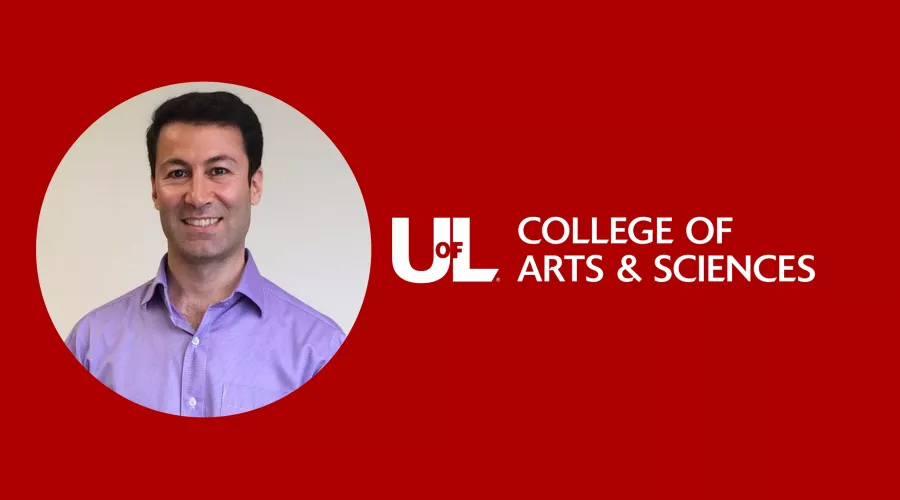Powering the Future: UofL Chemistry Associate Professor Named Top Scholar for Groundbreaking Energy Research
July 23, 2025
By Stephanie Godward, Communications and Marketing Director, College of Arts & Sciences
Associate Professor of Chemistry Farshid Ramezanipour has been named a 2024 Top Scholar by ScholarGPS for his energy research accomplishments over the past five years.
Ramezanipour’s research focuses on solid-state inorganic materials. Energy research is at the center of his current projects, which involve the synthesis and study of complex oxide materials for applications in batteries, fuel cells, electrocatalysis, and magnetism.
“We work on materials for a variety of energy related applications,” he states. “Many technological advances would not have been possible without devices that convert and store energy; a well-known example are the batteries found in phones, laptops, and many other electronics. Any device that converts or stores energy consists of different components, and each component is made of materials with specific properties. The design of those materials at a microscopic level is essential to achieving the function that those devices need to perform.”
ScholarGPS, a company based in California, provides a continually updated, fully indexed compilation of metadata corresponding to over 200 million archival publications (journal papers, books, book chapters, conference papers, and patents) drawn from across the world.
“It's great to see that our work is acknowledged and recognized,” Ramezanipour said. “It is certainly a source of motivation to continue my efforts and work towards greater discoveries. It shows that not just me, but many other researchers at UofL can operate at a very high level, and their research can compete with the work that is being done in many world class institutions.”
He also said that it is a reminder that if we invest in research, it will continue to attract even more talented students and faculty.
A wide range of material synthesis and characterization techniques are utilized in Ramezanipour’s projects, such as diffraction, electron microscopy, photoelectron spectroscopy, magnetometry, charge transport, electrochemical impedance and electrocatalytic studies.
In Ramezanipour’s chemistry lab, students and researchers are creating materials with powerful potential. These materials are made up of vast, repeating networks of positively and negatively charged ions—like a carefully constructed 3D puzzle at the atomic level. By changing which ions they use and how those ions are arranged, the team can control the properties of the material. That means they can design materials to do specific jobs. One exciting focus of their research is creating materials that act as catalysts—substances that speed up chemical reactions. In this case, they’re developing catalysts that can help split water into hydrogen and oxygen using electricity, a process known as electrochemical water splitting.
Why does this matter? Hydrogen is a key ingredient in producing ammonia, which is the foundation of most fertilizers—and fertilizers are essential to modern agriculture and global food supply. Hydrogen can also be used as an extremely effective and clean source of energy. So, by creating better catalysts, Ramezanipour and his team are contributing to cleaner energy and a more sustainable future for food production.
Students at all levels have the opportunity to get involved in this kind of innovative research as experiential learning.
“The Chemistry Department is home to a lot of high-quality research in several different areas, such as materials, organic, analytical, physical, inorganic and biochemistry,” he said. “Graduate students get to work on cutting edge projects and build their knowledge in the field of their choice. The skills they learn during their graduate studies can help prepare them for successful careers. We also have research opportunities for undergraduate students. They can do research for credit and if they want to work more extensively on the project, they can coordinate with the research advisor and definitely do that.”
For students and faculty, it’s an exciting time to contribute to UofL’s reputation as a research and innovation powerhouse.
“I would say one major strength is the availability of dedicated researchers who are extremely knowledgeable in their fields and can provide excellent training to students who are interested,” Ramezanipour said. “UofL is an R1 institution and can offer world class training to students who are excited about research. In fact, one main area of focus for me and many of my colleagues is helping our students build a solid foundation of knowledge and accomplishments to help them compete with the students who graduate from bigger institutions in the country. And I do believe that our students can do that. We can train a great generation of innovators here at UofL.”
Related News





